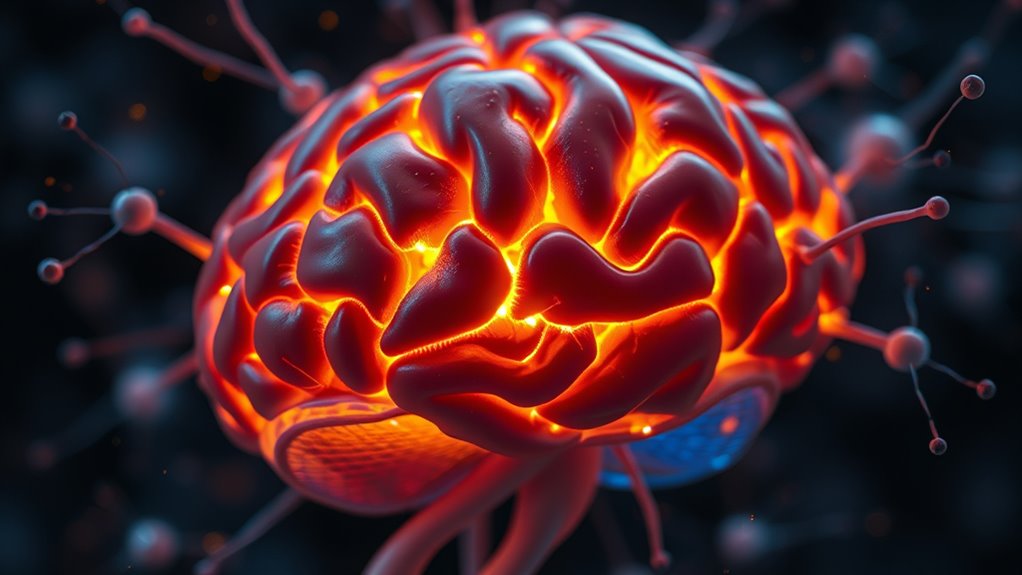The neuroscience of gratitude shows that when you focus on appreciation, specific brain regions like the prefrontal cortex and limbic system activate, promoting positive emotions and emotional regulation. Repeated gratitude strengthens neural pathways, making gratitude more automatic and fostering neural plasticity. This rewiring enhances resilience, reduces stress, and boosts social bonds through chemicals like dopamine and oxytocin. Understanding these processes reveals how practicing gratitude can reshape your brain for lasting well-being—discover more about how it works.
Key Takeaways
- Gratitude activates brain regions like the prefrontal cortex and limbic system, enhancing emotional regulation and positive feelings.
- Regular gratitude strengthens neural pathways, promoting neuroplasticity and making gratitude responses more automatic.
- Experiencing gratitude reduces activity in the amygdala, decreasing stress and fostering emotional resilience.
- Gratitude triggers the release of neurochemicals like dopamine and oxytocin, reinforcing social bonds and feelings of connection.
- Cultivating gratitude rewires the brain for optimism and resilience, leading to lasting improvements in mental well-being.

Have you ever wondered what happens in your brain when you feel grateful? When gratitude arises, it’s more than just a fleeting emotion; it involves intricate processes within your neural pathways. These pathways act like communication highways, transmitting signals that influence how you perceive and respond to positive experiences. When you consciously recognize and feel thankful, your brain activates specific regions, such as the prefrontal cortex and the limbic system, which are essential for emotional regulation. This activation helps you process feelings of appreciation more effectively, fostering a sense of well-being. Over time, repeated experiences of gratitude strengthen these neural pathways, making gratitude more automatic and accessible in daily life. Additionally, engaging in gratitude practices can promote neural plasticity, allowing the brain to adapt and reinforce these positive patterns over time.
Understanding how gratitude influences your neural pathways reveals its profound impact on emotional regulation. When you practice gratitude regularly, your brain shifts toward a more positive and resilient state. This shift occurs because gratitude reduces activity in the amygdala, the brain’s fear and stress center, while enhancing activity in areas responsible for positive emotions. As a result, you become better equipped to manage stress and bounce back from setbacks. This improved emotional regulation means you’re less likely to be overwhelmed by negative feelings, allowing you to maintain a balanced mood even during challenging times. The brain’s plasticity—its ability to rewire itself—means that cultivating gratitude can lead to lasting changes in how you handle your emotions.
Practicing gratitude reduces amygdala activity and boosts positive emotional regions, fostering resilience and emotional balance.
Moreover, gratitude’s effect on neural pathways extends beyond immediate emotional regulation. It fosters a sense of social connectedness, activating neural circuits involved in empathy and compassion. This social dimension enhances your overall well-being because humans are inherently social creatures. When you acknowledge the kindness or support of others, your brain releases neurotransmitters like dopamine and oxytocin, reinforcing positive social bonds. This biological feedback loop encourages more acts of kindness and gratitude, creating a cycle that boosts your mental health and strengthens your relationships.
In essence, gratitude rewires your brain by reinforcing pathways associated with positive emotions and adaptive emotional regulation. This neurological foundation supports a more optimistic outlook and resilience against stress. When you intentionally cultivate gratitude, you’re not just experiencing fleeting happiness—you’re actively shaping your brain’s architecture to foster lasting well-being. This neural reshaping makes gratitude a powerful tool for improving your mental health, helping you navigate life’s ups and downs with greater ease and emotional stability. So, the next time you pause to feel grateful, remember that you’re rewiring your brain for a healthier, more positive life.
Frequently Asked Questions
Can Gratitude Improve Mental Health Disorders?
You might wonder if gratitude can improve mental health disorders. While it’s not a cure-all, practicing gratitude can positively influence your brain by promoting neuroplasticity, helping you reframe negative thoughts. It also reduces stress and emotional reactivity, which may help with addiction recovery. Regularly focusing on gratitude strengthens neural pathways associated with positive feelings, supporting overall mental well-being and offering a helpful supplement to traditional treatments.
How Quickly Does Gratitude Affect Brain Chemistry?
When you practice gratitude, you may notice changes in your brain chemistry fairly quickly, often within minutes to hours. This is because gratitude triggers a positive neurotransmitter response, releasing feel-good chemicals like dopamine and serotonin. Over time, consistent gratitude can enhance brain plasticity, strengthening neural pathways associated with positive emotions. So, your brain adapts rapidly, making you feel more resilient and happier as you cultivate gratitude regularly.
Is Gratitude Beneficial for All Age Groups?
Did you know gratitude boosts well-being across all ages? You’ll find that it positively impacts child development by fostering emotional resilience and social skills. For the elderly, gratitude enhances mental health and reduces loneliness. No matter your age, practicing gratitude can strengthen relationships and promote a happier, healthier life. So, yes, gratitude benefits everyone—children, adults, and seniors alike—making it a powerful tool for overall well-being.
Does Cultural Background Influence Gratitude’s Impact?
You might wonder if cultural background influences gratitude’s impact. It does—cultural expression and gratitude rituals vary widely, shaping how you perceive and practice gratitude. In some cultures, regular gratitude rituals strengthen emotional bonds, boosting well-being. In others, expressions of gratitude are more subtle. Recognizing these differences helps you understand that gratitude’s effects are not universal but deeply rooted in cultural context, enhancing its meaningfulness for you.
Are There Any Negative Effects of Practicing Gratitude?
You might think practicing gratitude has no downsides, but watch out for gratitude fatigue—where it becomes overwhelming or feels forced. Overdependence on gratitude can lead to dismissing genuine emotions or ignoring problems, ironically reducing true well-being. While gratitude generally boosts happiness, overdoing it might cause you to overlook valid feelings or stress, making the practice less effective or even counterproductive. Balance remains key.
Conclusion
By understanding the neuroscience of gratitude, you can actively boost your well-being. Imagine someone who starts a daily gratitude journal; over time, their brain’s reward system strengthens, reducing stress and increasing happiness. For instance, a case study shows that regularly expressing gratitude can rewire your brain, making positivity more natural. So, next time you reflect on what you’re thankful for, you’re not just feeling good—you’re rewiring your brain for a healthier, happier life.










